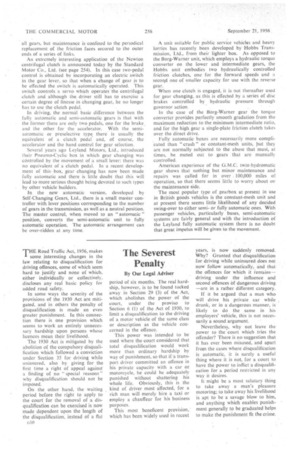The Severest Penalty
Page 128

If you've noticed an error in this article please click here to report it so we can fix it.
By Our Legal Adviser
THE Road Traffic Act, 1956, makes
some interesting changes in the law relating to disqualification for driving offences, some of which seem hard to justify and none of which, either individually or collectively, discloses any real basic policy for added road safety.
In some ways the severity of the provisions of the 1930 Act are mitigated, and in others the penalty of disqualification is made an even greater punishment. In this connection there is one provision which seems to work an entirely unnecessary hardship upon persons whose licences mean their livelihood.
The 1930 Act is mitigated by the abolition of the compulsory disqualification which followed a conviction under Section 35 for driving while uninsured, also by giving for the first time a right of appeal against a finding of no special reasons" why disqualification should not be imposed.
On the other hand, the waiting period before the right to apply to the court for the removal of a disqualification can be exercised is now made dependent upon the length of the disqualification, instead of a flat G10 period of six months. The real hardship, however, is to be found tucked away in Section 29 (3) of the Act, which abolishes the power of the court, under the proviso to Section 6 (1) of the Act of 1930, to limit a disqualification to the driving of a motor vehicle of the same class or description as the vehicle concerned in the offence.
This power was intended to be used where the court considered that total disqualification would work more than ordinary hardship by way of punishment, so that if 'a transport driver committed an offence in his private capacity with a car or motorcycle, he could be adequately punished without shattering his whole life. Obviously, this is the kind of driver most affected, for a rich man will merely hire a taxi or employ a chauffeur for his business purposes.
This most beneficent provision, which has been widely used in recent years, is now suddenly removed. Why? Granted that disqualification for driving while uninsured does not now follow automatically, and that the offences for which it remains-driving under the influence and second offences of dangerous driving —are in a rather different category.
If it be argued that a man who will drive his private car while drunk, or in a dangerous manner, is likely to do the same in his employers' vehicle, this is not necessarily a sound argument.
Nevertheless, why not leave the power to the court which tries the offender? There is no suggestion that it has ever been misused, and apart from the cases where disqualification is automatic, it is surely a useful thing where it is not, for a court to have the power to inflict a disqualification for a period restricted in any way it desires.
It might be a most salutary thing to take away a man's pleasure motoring; to take away his livelihood is apt to be a savage blow to him, and anything which enables punishment generally to be graduated helps to make the punishment fit the crime.




































































































































































































































































































































